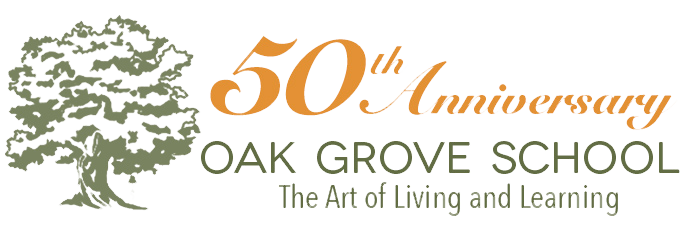Technology keeps us connected in ways not possible during other times in human history. It has saved lives, improved efficiencies, and made for more effective communication. Technology allows us to work remotely, which can have a positive impact on our carbon footprint.
Oak Grove is thrilled to support an on-campus residency with Benjamin Mertz, composer, performer, and song leader who specializes in music of the Black Spiritual tradition.
“Emergent Curriculum,” is just what it sounds like. Teachers observe and listen to children for insight into their interests and hypotheses.
Interacting with the greater Krishnamurti community, immersing themselves in a different culture, and making new friends at their sister schools are three of the intentions of Oak Grove’s annual senior trip to India.
The student newspaper is a great way for students to engage with peers on important topics and to find a communal voice for change, as well as to develop their own individual voices.
The intention of Pastoral Care Time is to honor the start of a new day, to mark the transition from home to school.
Oak Grove high school students collaborate with government agencies in a clean-up effort.
Often, people visit Oak Grove School for the first time and share a feeling of peacefulness, of oneness, of familiarity.
Enjoy video and photos from our 2021 high school graduation ceremony!
Oak Grove families and friends gathered on campus for a socially-distanced outdoor screening of our all-school musical production of Matilda.
CONTACT OAK GROVE
Oak Grove School of the Krishnamurti Foundation of America
CALL: 805 646 8236
EMAIL: info@oakgroveschool.org
MAIL: 220 West Lomita Avenue
Ojai, California 93023-2244
Latest News
 India Night 2026February 27, 2026 - 2:49 pm
India Night 2026February 27, 2026 - 2:49 pm Day of Reading Puts the FUN in Fundraising!February 20, 2026 - 12:16 am
Day of Reading Puts the FUN in Fundraising!February 20, 2026 - 12:16 am Middle School Visits Wyoming’s Teton Science SchoolsFebruary 15, 2026 - 1:28 pm
Middle School Visits Wyoming’s Teton Science SchoolsFebruary 15, 2026 - 1:28 pm Rooted in DignityJanuary 29, 2026 - 4:02 pm
Rooted in DignityJanuary 29, 2026 - 4:02 pm Day of Reading Votes Raptor CenterJanuary 27, 2026 - 9:43 pm
Day of Reading Votes Raptor CenterJanuary 27, 2026 - 9:43 pm
Join us Thursday night for INDIA NIGHT! Games, snacks, and stories from our seniors about their experiences in India.
#classof2026 #krishnamurtischools #theartoflivingandlearning #worldtravel #experientiallearning #seniortrip #oakgroveschoolojai #globalcommunity #gratitude

A few pics from our recent 7th and 8th-grade trip to Wyoming`s Teton Science School @tetonnationalpark . Guided by the amazing staff @tetonscience , students and chaperones use cross-country skis, snowshoes, vans, and even a horse-drawn carriage to observe wildlife such as moose, elk, and bald eagles. As with outdoor education program across all grades, our annual field trip to the Teton Science Schools truly embodies the Art of Living and Learning. As one student noted: “During the trip I learned that you should always enter an activity with an open mind.”
Learn more about our Teton trip and other recent stories by visiting the Lizard Blog! (link in bio)
#grandtetonnationalpark #tetonscienceschools #wyoming #outdooreducation #middleschool #theartoflivingandlearning #snowshoes #crosscountryskis #learning #science #middleschooltrip #friends

Fun High School "Mini Project" stop motion animation by Freya! Designed to foster curiosity and creativity, Mini Projects offer faculty members the chance to share personal interests and expertise while connecting with students across High School grade levels. These small group activities encourage meaningful interactions, strengthen relationships, and inspire learning outside the traditional classroom setting. #theartoflivingandlearning #miniproject #highschool #curiosity #creativity #transformation #oakgroveschoolojai

What began as a joyful day of delivering Singing Grams ❤️ 🎶 culminated in a spirited assembly celebrating our students and their efforts to raise funds for both Oak Grove and @ojairaptorcenter . Thank you, wholeheartedly, for supporting this year’s Day of Reading. Here’s to a restful break filled with great books and inspired reading! 🎉📚🎶❤️🦎🦎
#studentfundraiser #community #gratitude #dayofreading #loveofreading #reading #oakgroveschoolojai #ojaicalifornia

Non-Discrimination Policy
Oak Grove School does not discriminate on the basis of any individual or group identity characteristics, such as but not limited to race, color, gender identity or expression, sexual orientation, age, national or ethnic origin, differing mental or physical abilities, or family structure in the administration of its educational or admissions policies, employment practices, scholarship, and other school-administered programs. View the unabridged policy.


